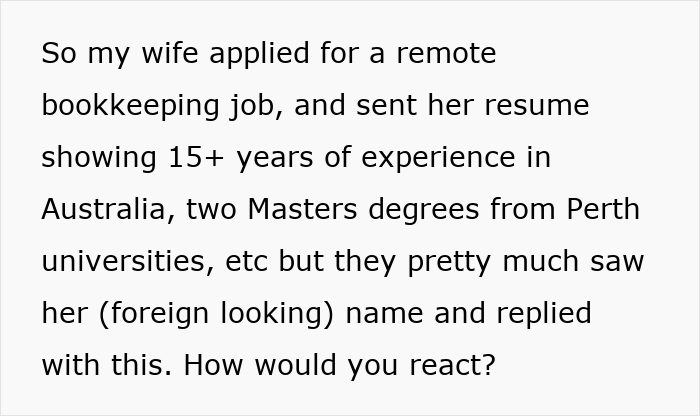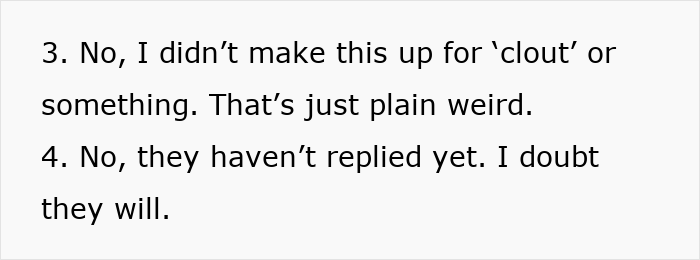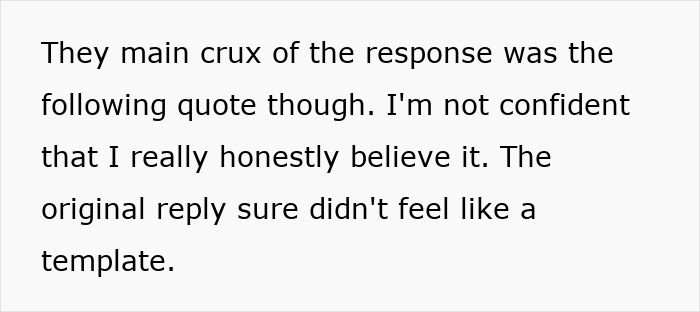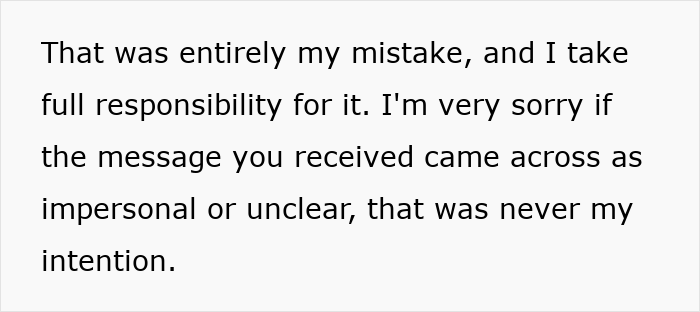Having multiple degrees and over a decade of experience is the sort of thing that most employers are really looking for. So getting a rejection email with vague reasons might end up raising some questions.
A man shared a series of screenshots from a rejection letter his wife got for a remote, Australian bookkeeping job. The issue? His wife was an Australian citizen with 15 years of experience and two Masters degrees. People online gave some suggestions and speculated why the company’s emails were so strange.
When getting a rejection letter, it’s still nice to know why they went with another candidate

Image credits: milesb
But one man felt something was off when viewing the email his wife got





Image credits: hryshchyshen (not the actual photo)






Image credits: milesb
The email was confusing enough to raise a few questions

Image credits: freepik (not the actual photo)
The company’s initial apology for sending the “wrong response template” may well be a reflection of a breakdown in their applicant-tracking system: someone could easily have clicked the wrong thing or mixed up batch mailings, especially on a busy hiring day. In the meantime, the mention of “permanent residency” and “AEST business hours” implies a location-based filter excluding anyone not specifically confirmed as locally based, even though Heryati has lived and worked in Perth for over sixteen years. It’s entirely likely that a look at her résumé created a mistaken assumption that she was based offshore or would not regularly take calls within Australian business hours. However, the specific reasons for rejection listed in the emails still seem strange.
A second factor is the unconscious bias that sometimes creeps into hiring. Unusual-sounding or “foreign”-sounding names can lead to a snap decision, and unless the recruiter takes the extra step of verifying information, citizenship, local address, current employment, those instant conclusions can dictate who even gets to speak with the hiring manager. The Australian Broadcasting Corporation reports that name-based discrimination is still sadly prevalent. In Heryati’s case, her strong qualifications and local experience should have overridden any such bias, but if the system flagged her name as outside the usual candidate pool, the human review might never have happened.
At this point, Miles has a few constructive routes to explore. He could formally request a brief debrief call with the recruiter or hiring manager, framing it as a desire for feedback “to improve future applications” keeps the tone professional and non‑accusatory. Sending a concise one‑page summary that highlights Heryati’s Australian citizenship, Perth address, current local role, and relevant degrees could cut through any lingering confusion. If the company still refuses to move, Miles can remind them gently of anti‑discrimination legislation that covers nationality, name, and residency, often a mention of an equitable‑work policy will result in a more thorough internal rethink.
There are some organizational reasons this could have happened

Image credits: DC Studio (not the actual photo)
If these are delayed, escalating internally within the organization could also work. Reaching out to the People & Culture head or immediate hiring manager (rather than the generic HR email address) sometimes results in faster responses. Alternatively, seeking confidential advice from a workplace ombudsman or legal advisor will clarify Heryati’s rights and prepare them for any formal complaint. If the company truly values its reputation, even a quietly worded LinkedIn or Threads post summarizing the facts, without casting blame, can spur a behind‑the‑scenes re‑evaluation of their processes.
None of these tactics guarantees an offer, but they do introduce transparency, and that in itself has value. By pushing courteously for clarity, documenting facts, and invoking considerations of fair work, Miles and Heryati have a good chance of discovering whether this was an innocent systems glitch or a deeper issue of bias. In either event, they’ll have done everything they could to ensure that merit, not flawed assumptions, drive the outcome.
This story reveals that something as simple as a name can get perfectly viable candidates rejected. The Australian Human Rights Commission found that Anglo-Saxon names had a 42% call-back rate, while indigenous-sounding names had only a 33% call-back rate. Even worse, “middle eastern” names had a 22% call-back rate, almost half that of Anglo names. While there might not be enough evidence to say that is exactly what’s happening here, the truth is that this sort of thing has a precedent in Australia.
Readers were indignant on his behalf


















from Bored Panda https://ift.tt/9bm32Me
via IFTTT source site : boredpanda